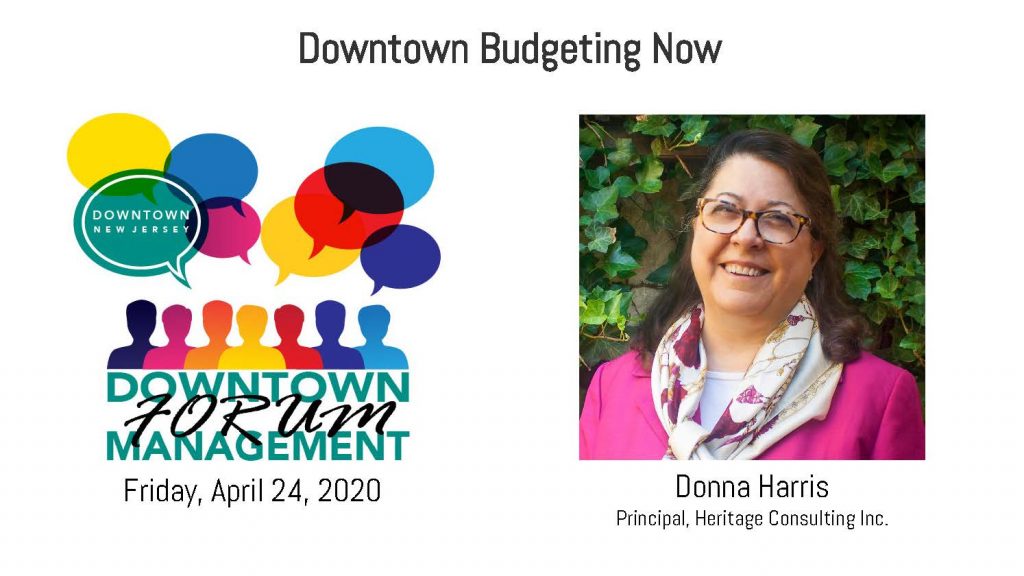Downtown Budgeting Now
Courtenay D. Mercer, PP, AICP
Executive Director, Downtown New Jersey
Rachael Thompson Panik
Associate Planner, Mercer Planning Associates
April 24, 2020
Downtown New Jersey is providing a series of virtual opportunities for downtown managers, economic development professionals, and public officials to exchange ideas about best practices related to downtown economic development in light of the COVID-19 crisis.
The COVID 19 pandemic has left many downtown organizations with budget shortfalls, either from special event cancellations, stalled membership drives or fundraising events that have been postponed. Board members are asking how to we readjust our downtown organization’s budget to deal with these new and changing realities?
At our fifth exchange on Friday, April 24, 2020, we were joined by Donna Ann Harris of Heritage Consulting Inc., a Philadelphia based firm that works nationally in downtown and commercial district revitalization. Over the years Donna has worked with many Main Street New Jersey communities on board training and development, fundraising and strategic planning. Donna provided insights about the board’s role in financial oversight, and gave some tips about making cuts to your budget if absolutely necessary.
Watch video:
Forum Summary
Donna Harris shared her unique insights about financial oversight in downtowns. Given changes to events and activities downtown in the midst of the pandemic, downtown organization’s boards and staff have concerns about their futures. In some cases, it is uncertain whether property owners will make their assessment payments, and since many events have been cancelled, opportunities for fundraising have been limited.
Given these changes, boards are faced with many challenges. District management organizations may rely on local government contributions that are no longer there; and for many organizations, most events that make revenue for the organization are postponed or even cancelled. Given the uncertainty of future events and fundraising opportunities, boards must engage in scenario planning – adjusting budget scenarios to assess what will happen under different circumstances. The scenarios should consider many different options, including strategic alliances with other organizations, the potentialities of hosting online or curbside-style events, planning for new costs like hand sanitizer stations or cleaning vendors, and other “what-ifs.”
As these scenarios provide options for moving forward, it is of crucial importance that boards communicate their plans with their constituents and the larger community. As downtowns begin to reopen, boards must communicate their plans clearly, broadly, and consistently.
A key part of planning scenarios is creating a plan for cutting expenses and raising revenue. Donna provides general advice to consider when assessing cash flow, cutting costs, and raising revenue:
Cash Flow
- Hold on to your organization’s cash as long as possible.
- If your organization has reserves, you will have more options for reallocating funds.
- Consider credit lines if you are sure that you will be able to repay the loans.
Cutting Costs
- Do not cut anything that is a profit center. Profit centers are key for staying afloat when other aspects of the organization are in flux.
- There are several types of budget cuts that can be helpful: across the board cuts to all areas except staff, cuts to salaries and limited furloughs, selective cuts to specific programs and services/personnel.
- Across the board cuts are democratic and equal across all programs. This is often a good option for minor budget shortfalls, but it may not create enough cost savings for major shortages.
- Salary cuts and furloughs can feel fair across all employees. Ms. Harris recommends cutting higher salaries first and consider if furloughs would work given the additional federal support to unemployment insurance. If possible, try to maintain health insurance for those being furloughed.
- Selective cuts to programs, services, and personnel can be challenging, as staff costs are often the highest and most heavily scrutinized costs, and selective cuts and eliminations create “winners and losers.” When making cuts, consider eliminating the weakest programs or services after an internal review.
- Don’t waste the crisis. Take the opportunity to look carefully at programs and staffing to think about what is most needed when things come back.
Raising Revenue
- Be sure to thank your donors who have supported you in the past via email and mailers. After thanking them, consider reaching out to long-standing funders if you are hoping to have donors make more funds.
- As your organization considers making asks of supporters, consider which of your donors might not be in a place to be giving presently. Be mindful if it is appropriate to make asks in your community right now.
- Consider reaching out to people who do not typically supporting downtown, but may be in a place to give now.
- Solicit shoppers and residents to support your downtown organization. Make sure all asks are beautiful, clear, and concise, and that they convey that the needs are urgent. You could frame their contribution as a “special gift” that could be modest or larger, depending on the audience.
Ms. Harris then facilitated a Q&A discussion for downtown organization leaders:
Have you reduced staff?
- All of the participants have been able to keep all of their staff so far.
- In general, participants are waiting to see what happens with the next assessment before making any decisions.
What are your concerns about lost revenue/ideas for supplementing revenue?
- In the last recession, the impact was not immediate. The lost revenue was felt a year or a year and a half later when vacancies had risen, sponsorship declined, and assessment payments were not being made.
- Some BIDs are concerned about municipal contributions to BID budgets not coming through.
- Somerville has already received their first quarter assessment, and they have made it a point to have conversations with Council members about the importance of BIDs. They are considering allowing monthly payments instead of quarterly to help with cash flow.
- New Brunswick usually receives supplemental funding from the County, which they know is now not coming. They are in the process revising their budget lines to reflect this loss of income as well as that anticipated from cancelled events.
- Losing staff can be challenging for morale. Often when staff cuts are made, eventually those positions will still have to be filled, which can be very expensive in the long-term.
- Most participants have cancelled through the end of the summer, and potentially cancel further through the year. For many, sponsorships cover event costs. For some BIDs, most of their events are net zero, so they are not feeling the impacts of missing these events.
- Some are still hoping to host events, such as downtown farmers markets, where customers must pre-order from the farmers market to pick up. They are also considering virtual farmer’s markets for vendors who have the capacity to take their services online.
Has anyone reduced vendor contracts?
- One BID is renegotiating its events coordination contract with logistics vendor, and another is renegotiating its cleaning contract.
- A key in cancelling and renegotiating contracts is to be tactful and try not to “burn the bridge” in terms of relationships with the vendor, as you will hopefully work with them again in the future.
Has anyone done fundraising for your organization?
- Many were reluctant to fundraise for the BID when their member businesses are struggling.
- Organizational fundraising must be done carefully and with tact, and with the messaging that support for the organization is going to ensuring the success of local businesses.
- A recommendation is to consider a “50/50” or shared relief fund, through which some of the funds would go to the local businesses sand some would go towards keeping the downtown organization intact. Another option is to solicit go-fund-me.
Have you applied for PPP, Small Business Administration Grants, or other relief funds?
- Some of the participants are applying right now. One BID applied and was denied in the first round.
- One participating BID decided not to apply for federal or state funding so as not to compete with small businesses. In addition, they are pulling together a GoFundMe for emergency crisis funds for their businesses.
- Some BIDs are hiring a CPA to help small businesses apply to SBA funding.
What are downtown organizations doing to create grant opportunities or relief funds for local businesses fairly?
- Many are concerned about starting and managing their own relief fund due to resource constraints, and/or conflicts of interest/appearances of favoritism.
- Several BIDs have formed partnerships with local foundations that have more experience managing grant programs, and can provide a level of objectivity in selecting grantees.
- The Westfield Foundation raised over $200k that it is distributing as $2k grants.
Other discussion
- BIDs may should consider allocating resources to activities that benefit the entire district, like beautification, buying safety supplies, murals, etc.
- BIDs should be looking for ways to drive people back to the streets as things begin to reopen. On idea is to close down the street (maybe once a week or on weekends) to help create space for social distancing. Some European communities allow restaurants to set up tables in public plazas to help increase capacity.


